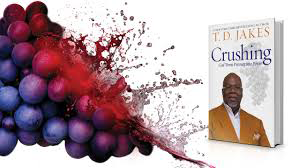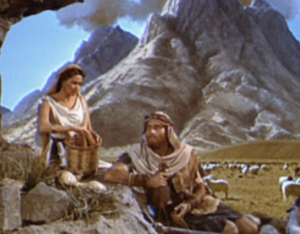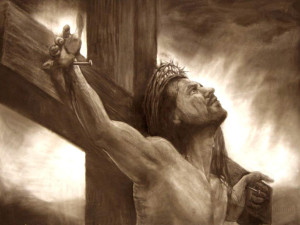 In this session of Crushing by TD Jakes, we review chapter 8 and learn get an up front and personal perspective of love and commitment.
In this session of Crushing by TD Jakes, we review chapter 8 and learn get an up front and personal perspective of love and commitment.
Crushing for the purposes of making God’s eternal wine requires us to change the way we see our lives. Just as winemaking necessitates that the grapes must be crushed to extract the juice for fermentation, our crushing relies on the power of the blood to pay the price, which Jesus did for us on the cross. While God is certainly not violent or sadistic, He requires us to value the gift of grace we have been given.
 This chapter is probably more disturbing and uncomfortable to men readers than it is to women. The women can probably more relate to Zipporah and how her husband shattered her dreams and tore up her agenda when following God. But for men, the most uncomfortable moments can be found when Moses, after experiencing the burning bush in Exodus 3, leaves Midian, along with his wife and children in order to go back to where he came from and confront Pharaoh with God’s message:
This chapter is probably more disturbing and uncomfortable to men readers than it is to women. The women can probably more relate to Zipporah and how her husband shattered her dreams and tore up her agenda when following God. But for men, the most uncomfortable moments can be found when Moses, after experiencing the burning bush in Exodus 3, leaves Midian, along with his wife and children in order to go back to where he came from and confront Pharaoh with God’s message:
On the way to Egypt, at a place where Moses and his family had stopped for the night, the Lord confronted him and was about to kill him. But Moses’ wife, Zipporah, took a flint knife and circumcised her son. She touched his feet with the foreskin and said, “Now you are a bridegroom of blood to me.” (When she said “a bridegroom of blood,” she was referring to the circumcision.) – Exodus 4:24-26 NLT
What does blood symbolize to you? Why?
When you consider its importance in the Bible, which we’ve already started to explore, what strikes you about the way God values blood?
What about the scene where Moses’ wife obeys God and makes him a “bridegroom of blood”? What troubles you in this scene? What makes sense to you?
This passage often troubles readers for many reasons. Why would an all-knowing, all-powerful God commission Moses to lead His people out of bondage in Egypt only to kill Moses before He even gets started? We know God never goes back on His word. So why is circumcision apparently so significant to the Lord — so important that it becomes, literally, a matter of life and death for someone God Himself chose?
We also see another challenging section in scripture about when Abram was instructed to sacrifice his son, Isaac.
As a way of sealing these relationships (covenants), God required a powerful act to symbolize the intimate surrender.
What do the two Biblical scenes have in common? How can you relate the two?
If someone asked you why God required His people to be circumcised in ancient times, what would you tell them? How would you explain the spiritual significance of circumcision?
 As we endure crushing events, experiences, and exhaustion, we might do well to remember how God has always maintained His faithfulness to His people. Time after time, even when they wander away into idolatry and sinfulness, God always pursues those he loves and wants to know. With this in mind, we must consider the implications for our own soul-numbing, life-threatening moments. If God has always kept His promises to His people — then doesn’t it make sense that He will keep His promises to us?
As we endure crushing events, experiences, and exhaustion, we might do well to remember how God has always maintained His faithfulness to His people. Time after time, even when they wander away into idolatry and sinfulness, God always pursues those he loves and wants to know. With this in mind, we must consider the implications for our own soul-numbing, life-threatening moments. If God has always kept His promises to His people — then doesn’t it make sense that He will keep His promises to us?
Keep in mind that God is passionately determined to save His children and restore relationship with them. Not only does he want to forgive us and give us a new identity — God also wants to rescue us, redeem us, and restore us. he wants us to know the joy, peace, and hope that comes from living purposefully, motivated by love and fueled by grace. Circumcision is no longer a physical requirement of our relationship with Him because of what Jesus did on the cross. But God still wants us to know the acute price that Jesus paid for us.
How does God sometimes remind you of what He’s done for you in the past?
What holidays, events, or symbols help you practice thanksgiving and give God praise for His presence and blessings in your life? What rituals or habits do you practice at these times?
Can you share about a time when you wandered from God because of the pain, stress, and anguish in your life? How did he pursue you despite your attempts to run?
 Time and time again, God’s signature points to the power of blood to seal our relationship with Him. On the cross, Jesus shed His blood — after symbolically asking HIs followers to partake of His suffering via bread and wine as His body and blood the night before. Rather than suffer spiritual death and spend eternity apart from God, we can now enjoy intimate fellowship because of what our Savior did for us. Christ became our sacrificial Lamb whose blood was spilled and smeared upon the doors of our hearts.
Time and time again, God’s signature points to the power of blood to seal our relationship with Him. On the cross, Jesus shed His blood — after symbolically asking HIs followers to partake of His suffering via bread and wine as His body and blood the night before. Rather than suffer spiritual death and spend eternity apart from God, we can now enjoy intimate fellowship because of what our Savior did for us. Christ became our sacrificial Lamb whose blood was spilled and smeared upon the doors of our hearts.
The bloodshed of God’s son saved our life. He spilled His blood on the cross to pay the debt of sin we could not pay. Jesus endured the ultimate crushing so that we could be free. Our crushing is not without purpose — God is always at work in the midst of it.
God never wastes a hurt
Thinking about the role that blood plays in most of the major stories in the Old Testament, which story speaks to your life right now? With which Bible personality do you most identify at this season of life? Why?
How has God stripped you of your defenses in order to help you grow stronger and become more mature?
What keeps you aware of the price that Jesus paid on the cross for your sins? How do you make sure His sacrifice maintains its power in your life instead of becoming too familiar as a sentimental cliche?
Use this season as a time to reflect on how much God loves you. Look back to times when things were so much different, and how your God was involved even when you were unaware. Treasure the passion He had for you, the grace He gave you in times of rebellion, but also the presence He had in always giving you the ability to turn to Him.
Engage with those around you that may be in seasons of confusion or in times of rebellion. Focus on what God has done, can do and most of all His promises.
Read on this coming week through chapter 9, “A Vat Full of Wait”.
Jakes, T. D. Crushing: God Turns Pressure into Power. FaithWords, 2019. Tyndale House Publishers. (2015). Holy Bible: New Living Translation (Ex 4:24–26). Carol Stream, IL: Tyndale House Publishers.
